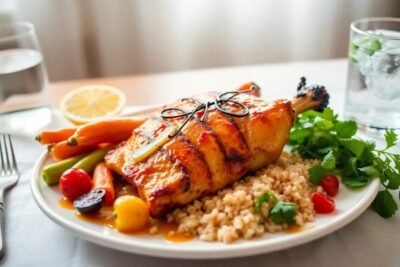
Diabetic-Friendly Nigerian Meals: A Guide to Healthy Eating
- Understanding Diabetes and Nutrition
- The Nigerian Diet: A Brief Overview
- Top Diabetic-Friendly Nigerian Ingredients
- Healthy Cooking Methods for Nigerian Meals
- Delicious Diabetic-Friendly Nigerian Recipes
- Portion Control and Meal Planning for Diabetics
- Tips for Eating Out: Nigerian Restaurants and Cafes
- Support and Resources for Diabetic Management
- Conclusion: Embracing a Healthier Lifestyle with Nigerian Meals
Understanding Diabetes and Nutrition
Diabetes is a chronic condition that affects the way the body processes glucose, a vital source of energy derived from food. There are two primary types: Type 1 diabetes, where the body does not produce insulin, and Type 2 diabetes, which is characterized by insulin resistance. This disease not only impacts daily health but also requires careful management, especially regarding lifestyle choices such as diet. Effective management of diabetes hinges on understanding the relationship between food consumption and blood sugar levels.
Nutritional choices play a crucial role in controlling blood sugar levels. Foods that are high in carbohydrates can significantly impact glucose levels; thus, it is essential for individuals with diabetes to choose carbohydrates wisely. Opting for complex carbohydrates, such as whole grains, legumes, and vegetables, can provide more sustained energy while promoting better blood sugar control. In contrast, simple carbohydrates, often found in sugary snacks and beverages, can lead to rapid spikes in insulin levels, complicating management efforts.
Incorporating diabetic-friendly Nigerian meals into the diet can greatly contribute to better health outcomes. These meals typically consist of high-fiber foods, lean proteins, and healthy fats while minimizing excessive sugars and refined carbohydrates. Furthermore, understanding portion sizes and balancing meals with an appropriate mix of nutrients is vital for regulating blood sugar levels. It is crucial to read food labels diligently and consider how different foods will affect one’s individual metabolic response.
Moreover, maintaining a consistent meal schedule can preventerratic blood sugar fluctuations, and adding physical activity into the daily routine can improve insulin sensitivity. Ultimately, making informed dietary choices is essential for individuals living with diabetes, as it empowers them to manage their condition effectively while enjoying a variety of delicious and nutritious foods.
The Nigerian Diet: A Brief Overview
The traditional Nigerian diet is diverse and vibrant, characterized by the rich cultural heritage of its people. It consists of a variety of staple foods, vegetables, proteins, and unique cooking methods that vary from region to region. Central to the diet are staples such as rice, yam, cassava, and maize, which are often complemented by a wide array of legumes, including beans and lentils, providing essential nutrients and fiber.
In Nigeria, food preparation typically involves methods such as boiling, steaming, frying, and cooking in rich sauces. Common cooking ingredients include palm oil, groundnut oil, and seasonings such as ginger, garlic, and local spices. Typical dishes feature an amalgamation of flavor profiles, utilizing proteins such as fish, chicken, goat, and beef, which are often combined with a variety of vegetables. Notable ingredients, including spinach, okra, and bitter leaf, not only enhance the flavor but also contribute significant health benefits.
The Nigerian diet can be seen as predominantly carbohydrate-rich, with a focus on starchy foods. This emphasis on carbohydrates can pose challenges for those managing diabetes, as it may lead to elevated blood sugar levels. However, by understanding the key components of the traditional diet, it is feasible to adapt and create diabetic-friendly Nigerian meals. This adaptation involves selecting lower glycemic index ingredients and incorporating more vegetables and lean proteins, ensuring that the meals remain flavorful and satisfying while aligning with diabetes management goals.
Overall, the richness of Nigerian cuisine offers numerous opportunities to modify traditional recipes into healthier options. By making thoughtful ingredient substitutions and employing healthy cooking methods, individuals can enjoy the unique flavors of Nigerian meals while keeping them aligned with diabetic nutrition principles.
Top Diabetic-Friendly Nigerian Ingredients
When it comes to preparing diabetic-friendly Nigerian meals, the choice of ingredients plays a crucial role in managing blood sugar levels while still enjoying traditional dishes. Incorporating a variety of healthy ingredients can provide the necessary nutrients without compromising on taste. Here are some essential ingredients commonly found in Nigerian cuisine that are both nutritious and suitable for those with diabetes.
Whole grains such as brown rice, millet, and quinoa serve as excellent bases for meals. Unlike their refined counterparts, whole grains are packed with fiber, which helps to slow down the absorption of carbohydrates, leading to more stable blood sugar levels. Integrating these grains into dishes fosters a feeling of fullness and provides essential vitamins and minerals.
Legumes, including beans and lentils, are another staple in diabetic-friendly Nigerian meals. They are high in protein and fiber while being low in fat, making them an ideal choice for maintaining blood sugar balance. Incorporating beans into soups, stews, or side dishes can add substantial nutritional value and satisfy hunger.
Lean proteins such as chicken, fish, and turkey are vital for a healthy diet. These proteins can help in tissue repair and muscle maintenance, important aspects for overall health management in individuals with diabetes. Opting for grilling or baking rather than frying can also minimize unhealthy fats, making these meals not only diabetic-friendly but also heart-healthy.
Lastly, a variety of vegetables should be included in each meal, focusing on non-starchy options like leafy greens, peppers, and tomatoes. These vegetables are low in calories and carbohydrates, rich in vitamins, and beneficial for metabolic health. By filling plates with colorful veggies, one can increase fiber intake and promote better overall health.
Incorporating these ingredients into a diabetic-friendly Nigerian meals plan enables individuals to enjoy delicious cuisine while keeping their blood sugar levels in check. With a focus on whole grains, legumes, lean proteins, and a variety of vegetables, a healthy and satisfying diet is achievable.
Healthy Cooking Methods for Nigerian Meals
When it comes to preparing diabetic-friendly Nigerian meals, the choice of cooking methods can significantly influence the overall health benefits of the dishes. Traditional Nigerian cuisine often involves frying and heavy use of oils, which can be detrimental for those managing diabetes. However, there are several healthier cooking techniques that can be employed without sacrificing flavor or cultural authenticity.
One effective method is grilling. Grilling meats and vegetables allows excess fats to drip away while retaining essential nutrients and flavors. The smoky taste developed during grilling can enhance the natural flavor of food, making it an appealing option for diabetic-friendly Nigerian meals, such as suya or grilled fish. Additionally, this technique can be easily incorporated into various traditional recipes.
Steaming is another excellent cooking approach that preserves the integrity and nutritional value of the ingredients. Steamed vegetables, such as fluted pumpkin leaves or bitter leaf, can be effortlessly integrated into traditional dishes, providing essential vitamins and minerals without added calories from oils. This method is particularly useful for preparing side dishes or accompaniments that complement main courses.
Furthermore, when using fats in cooking, opting for healthy sources is crucial. For instance, incorporating moderate amounts of healthy oils such as olive oil or avocado oil in your recipes can provide necessary fats without excessive calories. This is particularly important in dishes like egusi soup, where traditional recipes might call for higher oil content. Using these healthier fats not only caters to diabetic dietary requirements but also enriches the flavor and nutritional composition of the meals.
By adopting these healthy cooking methods—grilling, steaming, and utilizing heart-healthy fats—individuals can prepare traditional Nigerian dishes that align with diabetic-friendly guidelines. Such adaptations ensure that meals remain enjoyable while supporting better health outcomes.
Delicious Diabetic-Friendly Nigerian Recipes
Creating diabetic-friendly Nigerian meals can be both simple and satisfying, allowing you to enjoy traditional flavors while maintaining balanced nutrition. Below are several easy-to-make recipes that incorporate local ingredients and are tailored specifically for individuals seeking to manage their blood sugar levels.
One excellent option is **Okra Soup**. This dish is not only rich in nutrients but also low in carbohydrates. Begin by sautéing onions and bell peppers in a pot, then add chopped okra and let it simmer. Incorporate lean protein, such as fish or chicken, for added flavor and nutrition. Serve it with a side of **swallow**, using alternatives like cauliflower mash for a diabetic-friendly choice.
Another popular meal is **Peppered Chicken**. To prepare, season chicken pieces with a mix of spices, garlic, and ginger, and grill them for a delicious outcome. Pair the chicken with steamed vegetables, such as broccoli or spinach, to enhance the meal's fiber content. This provides essential nutrients without spiking blood sugar levels, making it a perfect component of diabetic-friendly Nigerian meals.
For a vegetarian option, consider **Efo Riro**, a flavorful spinach stew. Start by blending tomatoes and peppers, then cook it with onions and assorted proteins like shrimps or beans for heartiness. The spinach offers a wealth of vitamins while keeping carbohydrates in check, making it a nutrient-dense addition to your meal plan.
Lastly, **beans porridge** is another wholesome recipe that fits the criteria for diabetic-friendly Nigerian meals. Cook kidney beans or black-eyed peas with tomato and onion, enriching the dish with herbs. Serve hot for a filling meal that is lower in fat and high in fiber, promoting good health and satiety.
These recipes provide a glimpse into the variety of flavors and textures found in diabetic-friendly Nigerian cuisine. By utilizing local ingredients and simple cooking techniques, anyone can enjoy nourishing meals without compromising taste.
Portion Control and Meal Planning for Diabetics
For individuals managing diabetes, portion control and meal planning are essential strategies that can significantly affect blood sugar levels and overall health. Adopting effective portion control techniques allows diabetics to enjoy nutritious foods while preventing unnecessary spikes in blood glucose. When planning meals, especially in the context of traditional cuisines, it is crucial to strike a balance that embraces diabetic friendly Nigerian meals while monitoring portion sizes.
Portion control can be accomplished by utilizing smaller plates and bowls to visually manipulate serving sizes. This approach can help individuals feel satisfied with their meals without overeating. Additionally, measuring portions of carbohydrates and integrating a variety of nutrient-dense foods ensures that meals are balanced and satisfying. This is particularly relevant when incorporating staples like beans, lentils, and vegetables, which form the foundation of many delicious diabetic friendly Nigerian meals.
Meal planning plays an equally vital role in managing diabetes. Planning meals in advance allows individuals to prepare balanced diets that align with their nutritional requirements. Creating a weekly meal plan that includes diabetic-friendly dishes, which could feature traditional Nigerian dishes such as okra soup or jollof rice paired with grill chicken or fish, enables diabetics to enjoy their culture's cuisine without neglecting their health. Additionally, having a structured meal plan helps to reduce the temptation of unhealthy snack choices and fast foods, which may derail efforts in managing diabetes.
Incorporating a variety of proteins, healthy fats, and fiber-rich carbohydrates in meal planning can help maintain sustained energy levels and improve overall well-being. Furthermore, being mindful of glycemic indices when selecting foods contributes to more stable blood sugar control. By creating diverse and healthy meal options, individuals can enjoy satisfying and delicious diabetic friendly Nigerian meals while adhering to their dietary needs.
Tips for Eating Out: Nigerian Restaurants and Cafes
Dining out can present challenges for individuals with diabetes, particularly in Nigerian restaurants where traditional dishes may be high in carbohydrates and unhealthy fats. However, with careful planning and informed choices, it is possible to enjoy diabetic-friendly Nigerian meals when eating out. To begin with, it is essential to carefully review the menu. Look for options that emphasize lean proteins, vegetables, and whole grains. Dishes that feature grilled or steamed components rather than fried are typically healthier choices.
When browsing the menu, pay attention to descriptions that include terms such as “baked,” “grilled,” “stewed,” or “roasted,” as these cooking methods are usually healthier alternatives. For example, consider ordering grilled chicken or fish alongside a side of steamed vegetables rather than fried rice or pounded yam. Don’t hesitate to ask the restaurant staff for assistance; they can provide information about how the food is prepared and suggest modifications. Many Nigerian meals can be adjusted by reducing portions of starchy foods or substituting them for more vegetables, ensuring that your meal remains balance and suitable for a diabetic diet.
Mindful eating is another critical strategy when dining out. Taking time to savor each bite can enhance satisfaction and help you recognize when you are full, reducing the likelihood of overeating. Share larger dishes with companions; this allows you to enjoy the variety without consuming excessive calories. Also, consider starting your meal with a salad or a light soup, which can help you feel full and reduce overall calorie intake.
In conclusion, successful dining out as a diabetic does not have to be limiting. By making informed choices, asking for modifications, and practicing mindful eating, you can enjoy your meals while adhering to a healthy lifestyle, and still indulge in diabetic-friendly Nigerian meals with family and friends.
Support and Resources for Diabetic Management
Effectively managing diabetes requires a comprehensive approach that encompasses not just dietary adjustments, but also consistent support and access to valuable resources. For individuals seeking to enjoy diabetic-friendly Nigerian meals, leveraging online communities can provide a wealth of knowledge and shared experiences. Various platforms, ranging from social media groups to specialized forums, facilitate discussions among individuals with diabetes. These spaces offer a platform for exchanging recipes, cooking tips, and lifestyle management strategies tailored to the Nigerian cultural context.
Nutritional guides specifically designed for individuals with diabetes are indispensable resources. Many reputable health organizations now offer downloadable guides that focus on meal planning and portion control, essential aspects of developing a diabetic-friendly diet. These guides often emphasize the importance of whole foods, vegetables, and appropriate carbohydrate choices, which are crucial when considering traditional Nigerian diets. Adopting meal preparations that prioritize healthy alternatives can help individuals maintain their glucose levels while still enjoying flavorsome dishes.
Consultations with healthcare professionals, including dietitians and nutritionists who specialize in diabetes management, are also highly recommended. These experts can provide personalized advice on incorporating diabetic-friendly Nigerian meals into an individual's diet, ensuring nutritional needs are met without sacrificing taste or variety. Many clinics and hospitals in Nigeria offer services aimed at diabetes education and management, which can be valuable for sustained health improvement.
Finally, mobile applications and online platforms designed for tracking glucose levels, medications, and dietary intake can further support the management of diabetes. By combining these resources, individuals can enhance their understanding and practice of maintaining a diabetic-friendly lifestyle, ensuring they have the tools and support necessary to thrive.
Conclusion: Embracing a Healthier Lifestyle with Nigerian Meals
In the journey towards managing diabetes, it is essential to acknowledge that dietary choices play a crucial role in maintaining optimal health. Through the exploration of various diabetic-friendly Nigerian meals, we have demonstrated that it is indeed possible to indulge in the rich and diverse culinary heritage of Nigeria without compromising health. Traditional ingredients and cooking techniques can be adapted to create meals that are both nutritious and satisfying, ensuring that individuals with diabetes can partake in the joy of their culture.
By incorporating fiber-rich foods such as legumes, whole grains, and vegetables, along with lean proteins, individuals can create balanced dishes that help regulate blood sugar levels. The fusion of flavors that Nigerian cuisine offers—whether through stews, soups, or side dishes—can be harmoniously aligned with the dietary needs of those managing diabetes. These adaptations not only enhance the quality of meals but also promote overall well-being.
Moreover, embracing a healthier lifestyle goes beyond dietary changes; it encompasses a commitment to regular physical activity and mindful eating practices. Engaging with one's community and culture through food can motivate individuals to make better choices while reinforcing a sense of belonging and identity. By actively seeking out diabetic-friendly options, individuals can enjoy the vibrant tastes of Nigerian dishes while prioritizing their health.
Ultimately, the key takeaway is that managing diabetes does not mean sacrificing the flavors and traditions that enrich our lives. It invites creativity and innovation in the kitchen, allowing us to create meals that are both diabetes-friendly and culturally resonant. As such, we encourage readers to embrace this healthier lifestyle, celebrating the culinary delights of Nigeria while taking proactive steps toward their health and well-being.










